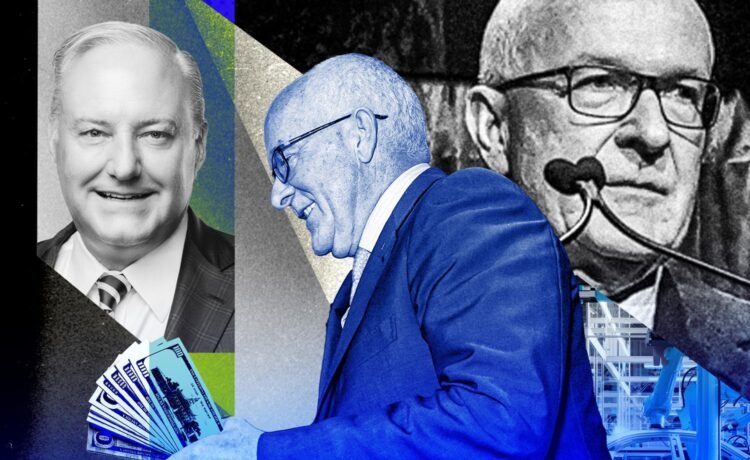Paramount Group CEO Albert Behler’s past business deals with a Paramount board member adds to the growing number of questions about the office landlord’s decision-making and the independence of its board.
Behler provided loans and invested in a failed company led by Mark Patterson, a member of the REIT’s board of directors, according to Securities and Exchange Commission filings reviewed by The Real Deal.
The revelation comes as Paramount and its embattled CEO continue to make headlines over shareholder and corporate governance concerns.
Earlier this year, Paramount said it made millions of dollars in previously undisclosed payments to Behler’s companies. In July, Paramount disclosed it was under a SEC investigation. And The Real Deal recently discovered that Behler personally pushed for a no-bid contract to a security company where his ex-girlfriend, 30 years his junior, was a senior manager.
Now, TRD found that Behler — who currently serves as chairman of the board — had extensive past business dealings with Mark Patterson, an independent board member who once chaired Paramount’s nominating and corporate governance committee. TRD also found that Patterson faced similar allegations about his objectivity and independence while serving on another board.
About a decade ago, Behler agreed to provide at least two loans to Boomerang Systems, a robotic garage company led by Patterson, as it neared bankruptcy. It is unclear whether the debt was ultimately paid back based on a review of bankruptcy and SEC filings.
“It’s not a good look, whether in fact he’s compromised or not; the optics are bad,” said Charles Elson, the founding director of the John L. Weinberg Center for Corporate Governance at the University of Delaware.
Paramount declined to comment. Patterson did not return a request to comment.
Independent board of directors are supposed to provide an added level of objective oversight for publicly traded companies. But the company’s disclosures around millions of dollars heading to Behler’s personal business, along with his high compensation relative to the stock’s performance, raise questions about whether the board is acting in shareholder’s interest or Behler’s.
This comes at a critical time. Paramount is in the midst of selling the company as its stock hovers around $7 per share.
Boomerang’s bankruptcy and Patterson’s undisclosed ties
Paramount and Behler’s ties to Patterson go back years.
Patterson, who was formerly a managing director of Merrill Lynch, became the CEO of Boomerang Systems in 2010. The company built a new technology that essentially created an automatic valet system where parked cars would slide to drivers on concrete slabs, no human operators needed.
In 2012, Boomerang announced that Paramount would use Boomerang’s technology for a 256-space garage in an unnamed multifamily project on the West Coast. At that time, Boomerang’s system was only installed in three properties, and Paramount’s project would have been by far its largest.
“Having an accomplished and experienced real estate firm like Paramount Group select Boomerang provides great affirmation of our value proposition of enhancing developer’s margins,” said Patterson in a release at the time.
Boomerang said its robotic car garage would expedite the construction timeline and improve the “economics of the project.” But Boomerang ran into one disaster after the next across its projects. In Miami’s Brickell neighborhood, a condo project using Boomerang left residents waiting hours to get their cars.
Behler was a major investor in Boomerang, according to SEC filings, and participated in offerings for convertible notes, a type of debt that can be converted into equity such as stock.
Behler also contributed to efforts to keep the company afloat. By late 2014, Behler joined other investors and committed up to $400,000 as an “affiliate” lender. Behler ultimately loaned the $400,000 and controlled over 5 percent of the common stock of Boomerang, owning over 1 million shares, according to an SEC filing as of June 2015.
But Boomerang filed for bankruptcy in August 2015 and Patterson, also a major stockholder in the company, stepped down as CEO.
In 2016, a bankruptcy judge approved the sale of the company’s assets to an existing lender for $2.5 million. Equity holders in the company were wiped out through bankruptcy. (The case officially closed in 2020.)
Behler was not listed as a creditor in Boomerang’s bankruptcy petition and it is unclear whether his loans were ever repaid.
In May 2018, Patterson joined Paramount’s board.
Patterson chaired Paramount’s nominating and corporate governance committee. He also served as the lead independent director, a role where Patterson acted as a liaison between Behler, the chairman of Paramount’s board, and the other independent board members.
Paramount never disclosed Behler’s past ties to Boomerang in its filings with the Securities and Exchange Commission or its proxy statement.
Stock exchanges set the rules for independent directors, but corporate governance experts say it’s not unusual for board members and CEOs to have friendly relationships.
Ann Lipton, a business law professor at the University of Colorado’s law school, described the standards for independence as “very loose.”
But Behler’s investment and possible debt to Patterson‘s former company raise questions about Paramount’s motivation for keeping Patterson on the board.
In 2021, Patterson was voted off the board by shareholders in an uncontested election, with 56 percent of shareholder votes going against Patterson. (Paramount said the vote was a result of Patterson’s role as lead independent board member and not because of his qualifications.)
“It’s very uncommon for shareholders to reject a director that way,” said Michael Levin, founder of consulting firm the Activist Investor.
Paramount ultimately overruled the shareholders and kept Patterson on the board, Crain’s reported. Paramount told shareholders it believed Patterson is a “valuable contributor” with a “tremendous skillset”, according to an SEC filing.
Patterson remains on Paramount’s board of directors, serving on the corporate governance committee.
The ends justify the means
Patterson’s board participation — and prior relationships — have raised concerns elsewhere.
Patterson serves on the board of Digital Realty, a data center REIT, where fellow Paramount board member, Greg Wright, is the chief investment officer.
The former chairman of Digital Realty, Laurence Chapman, took issue with Patterson and Wright’s relationship. In 2023, Chapman resigned from Digital Realty’s board and cited a number of alleged corporate governance issues by the board and Patterson in his resignation letter.
In addition to serving on Paramount’s board of directors, Wright used to work for Patterson and the two are personal friends, Chapman claimed.
Chapman said these relationships had the “potential to impact real or perceived objectivity and independence” of the board.
(Digital Realty said in an SEC filing that the company “wishes to emphasize that the written notification of resignation reflects the thoughts and beliefs of Mr. Chapman only.”)
Chapman also alleged that Patterson personally contacted other company directors at Digital Realty to lobby for executive changes, claiming such maneuvers were improper for someone in his board member position.
“When I tried to discuss my concerns about his approach, Mark told me that in his view, ‘The end justifies the means.’ That principle originated in Machiavelli’s ‘The Prince,’” wrote Chapman in the letter.
When it comes to the traits of good governance, Chapman went on, “Machiavelli’s principles seem to be the polar opposite.”
Read more

Paramount CEO directed no-bid contract to firm tied to ex-girlfriend

Troubled Paramount Group reveals it is under SEC investigation








Recent Comments